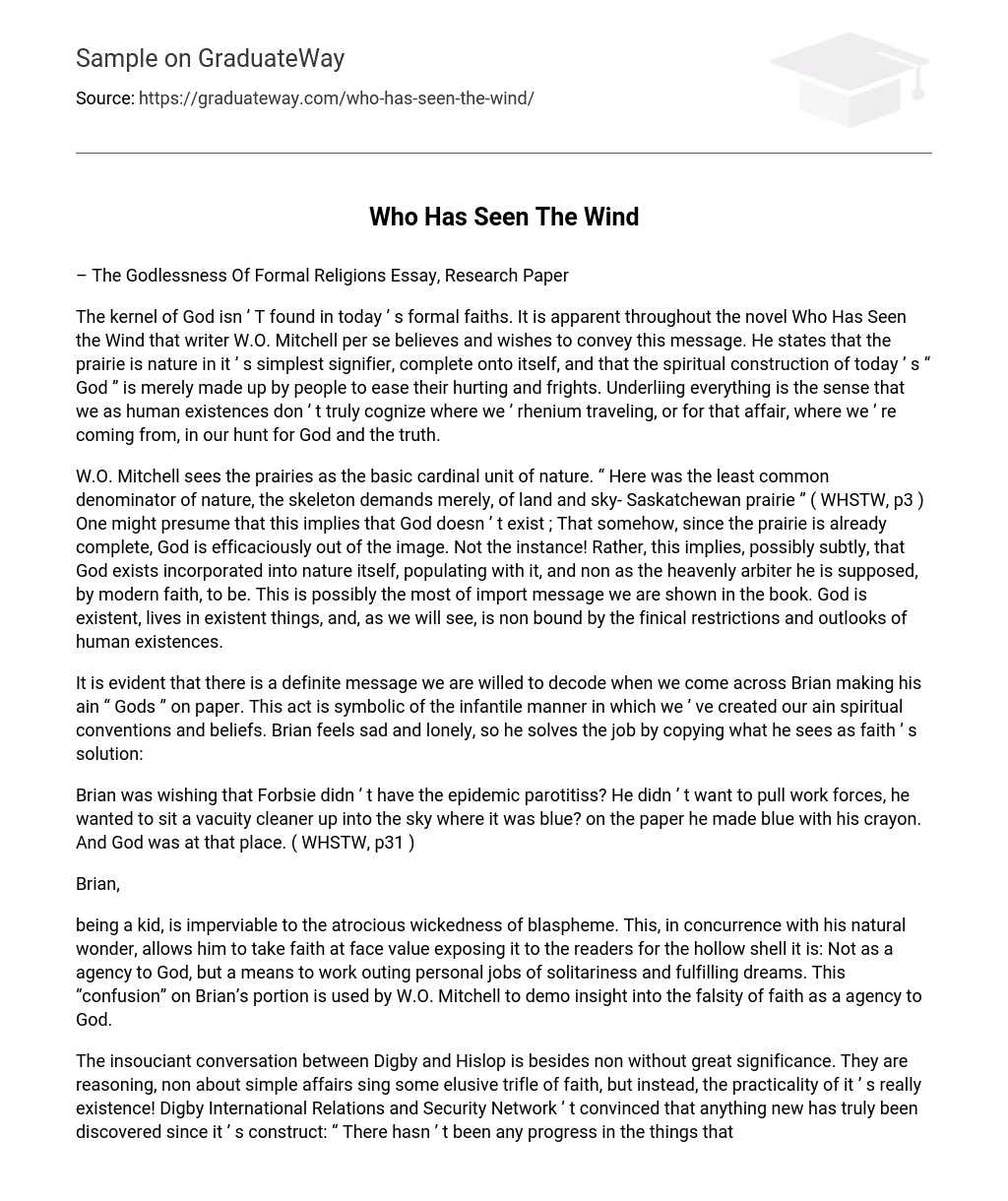The kernel of God isn ’ T found in today ’ s formal faiths. It is apparent throughout the novel Who Has Seen the Wind that writer W.O. Mitchell per se believes and wishes to convey this message. He states that the prairie is nature in it ’ s simplest signifier, complete onto itself, and that the spiritual construction of today ’ s “ God ” is merely made up by people to ease their hurting and frights. Underliing everything is the sense that we as human existences don ’ t truly cognize where we ’ rhenium traveling, or for that affair, where we ’ re coming from, in our hunt for God and the truth.
W.O. Mitchell sees the prairies as the basic cardinal unit of nature. “ Here was the least common denominator of nature, the skeleton demands merely, of land and sky- Saskatchewan prairie ” ( WHSTW, p3 ) One might presume that this implies that God doesn ’ t exist ; That somehow, since the prairie is already complete, God is efficaciously out of the image. Not the instance! Rather, this implies, possibly subtly, that God exists incorporated into nature itself, populating with it, and non as the heavenly arbiter he is supposed, by modern faith, to be. This is possibly the most of import message we are shown in the book. God is existent, lives in existent things, and, as we will see, is non bound by the finical restrictions and outlooks of human existences.
It is evident that there is a definite message we are willed to decode when we come across Brian making his ain “ Gods ” on paper. This act is symbolic of the infantile manner in which we ’ ve created our ain spiritual conventions and beliefs. Brian feels sad and lonely, so he solves the job by copying what he sees as faith ’ s solution:
Brian was wishing that Forbsie didn ’ t have the epidemic parotitiss? He didn ’ t want to pull work forces, he wanted to sit a vacuity cleaner up into the sky where it was blue? on the paper he made blue with his crayon. And God was at that place. ( WHSTW, p31 )
Brian, being a kid, is imperviable to the atrocious wickedness of blaspheme. This, in concurrence with his natural wonder, allows him to take faith at face value exposing it to the readers for the hollow shell it is: Not as a agency to God, but a means to work outing personal jobs of solitariness and fulfilling dreams. This “confusion” on Brian’s portion is used by W.O. Mitchell to demo insight into the falsity of faith as a agency to God.
The insouciant conversation between Digby and Hislop is besides non without great significance. They are reasoning, non about simple affairs sing some elusive trifle of faith, but instead, the practicality of it ’ s really existence! Digby International Relations and Security Network ’ t convinced that anything new has truly been discovered since it ’ s construct: “ There hasn ’ t been any progress in the things that count? it was all there with Plato – with Christ ” ( WHSTW, p29 )
And after Digby recalls Milt ’ s words about the relativity of ethical motives Hislop is left to hold on at straws mistily declaiming the fact that ethical motives must be and are merely founded in God. W.O. Mitchell introduces the Ben ’ s to throw a twist into the overly simplistic position of faith Hislop was seeking to develop. Without this position, faith as it is, idealistically the exact same for everyone, couldn ’ t exist. This forces him and the reader to come to footings with the fact that there is no individual set of basic intrinsic ethical motives all people will gravitate towards.
God will non be bound by our restrictions and outlooks. If what W.O. Mitchell suggests is true, so most people in the universe are lost spiritually, and aren ’ t populating to their full potency. They may believe in something, but are losing out on the benefits of gestating God on a higher and simpler degree. He besides implies that organized faith is a agency to confounding the world of Gods being – immanently taking people astray from the truth. Essentially – the hunt for God is a personal 1, when influenced by the dockets of others it becomes muddled and lost.





